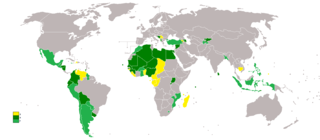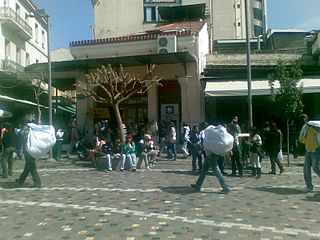
The International Organization for Migration (IOM) is an intergovernmental organization that provides services and advice concerning migration to governments and migrants, including internally displaced persons, refugees, and migrant workers. In September 2016, IOM became a related organization of the United Nations. It was initially established in 1951 as the Intergovernmental Committee for European Migration (ICEM) to help resettle people displaced by World War II. As of March 2019, the International Organization for Migration has 173 member states and eight observer states.

Aleksander Kwaśniewski is a Polish politician and journalist. He served as the President of Poland from 1995 to 2005. He was born in Białogard, and during Communist rule, he was active in the Socialist Union of Polish Students and was the Minister for Sport in the Communist government during the 1980s. After the fall of Communism, he became a leader of the left-wing Social Democracy of the Republic of Poland, a successor to the former ruling Polish United Workers' Party, and a co-founder of the Democratic Left Alliance.

Human migration is the movement of people from one place to another with the intentions of settling, permanently or temporarily at a new location. The movement is often over long distances and from one country to another, but internal migration is also possible; indeed, this is the dominant form globally. People may migrate as individuals, in family units or in large groups. There are four major forms of migration: invasion, conquest, colonization and immigration.
Subsidiarity is a principle of social organization that holds that social and political issues should be dealt with at the most immediate level that is consistent with their resolution.
A war of aggression, sometimes also war of conquest, is a military conflict waged without the justification of self-defense, usually for territorial gain and subjugation.
Giorgos Vasos Vassiliou is a Greek Cypriot politician who served as the third President of Cyprus from 1988 to 1993. He was also the founder and leader of the Cypriot United Democrats party (EDI) and a highly successful businessman.
Customary international law is an aspect of international law involving the principle of custom. Along with general principles of law and treaties, custom is considered by the International Court of Justice, jurists, the United Nations, and its member states to be among the primary sources of international law.

The International Convention on the Protection of the Rights of All Migrant Workers and Members of Their Families is a United Nations multilateral treaty governing the protection of migrant workers and families. Signed on 18 December 1990, it entered into force on 1 July 2003 after the threshold of 20 ratifying States was reached in March 2003. The Committee on Migrant Workers (CMW) monitors implementation of the convention, and is one of the seven UN-linked human rights treaty bodies.

Immigration to Greece percentage of foreign populations in Greece is 7.1% in proportion to the total population of the country. Moreover, between 9 and 11% of the registered Greek labor force of 4.4 million are foreigners. Migrants additionally make up 25% of wage and salary earners. Migrants are so plentiful that in a society with negative natural population growth, immigration has become the sole source of population increase overall.
Impunity means "exemption from punishment or loss or escape from fines". In the international law of human rights, it refers to the failure to bring perpetrators of human rights violations to justice and, as such, itself constitutes a denial of the victims' right to justice and redress. Impunity is especially common in countries that lack a tradition of the rule of law, suffer from corruption or that have entrenched systems of patronage, or where the judiciary is weak or members of the security forces are protected by special jurisdictions or immunities.
PICUM is a non-governmental organization that aims to promote respect for the human rights of undocumented migrants within Europe. PICUM also seeks to dialogue with organizations and networks with similar concerns in other parts of the world.
Child migration or "children in migration or mobility" is the movement of people ages 3–18 within or across political borders, with or without their parents or a legal guardian, to another country or region. They may travel with or without legal travel documents. They may arrive to the destination country as refugees, asylum seekers, or economic migrants.
The World Holocaust Forum is a series of events aiming at preserving memories of Holocaust atrocities.

The European Council on Tolerance and Reconciliation is a non-governmental organization that was established in Paris, France on 7 October 2008 to monitor tolerance in Europe. The Chairman of the Council is former British Prime Minister Tony Blair, and the President of the Council is Viatcheslav Moshe Kantor.

Viatcheslav Moshe Kantor is a Russian international public figure, a Jewish leader, businessman, peace activist, international philanthropist and scientist, who actively participates in the promotion of tolerance and reconciliation in the modern world. He is also engaged in fight against racism, antisemitism, xenophobia, neo-Nazism and intolerance, discussing and elaborating ways to stop nuclear proliferation and prevent a nuclear catastrophe.

Asylum in the European Union (EU) has its roots in the 1951 Convention Relating to the Status of Refugees, an agreement founded on Article 14 of the Universal Declaration of Human Rights. Following the adoption of the Schengen Agreement on the elimination of internal border controls of signatory states and its subsequent incorporation into the EU legislative framework by the Amsterdam Treaty, the EU set up a Common European Asylum System (CEAS) to unify minimum standards related to asylum, leaving up to EU Member States the discretion to establish procedures for obtaining and withdrawing international protection.
The European Medal of Tolerance is a medal established by the European Council on Tolerance and Reconciliation (ECTR) in 2008.

Migrant crisis is the intense difficulty, trouble, or danger situation in the receiving state due to the movements of large groups of immigrants escaping from the conditions which negatively affected their situation at the country of origin (departure). The “crisis” situation is not the refugee numbers but the system’s failure to respond in a orderly way in the government’s legal obligations. Some notable crisis are; European migrant crisis, English Channel migrant crisis and World War II evacuation and expulsion.

The United Kingdom renegotiation of European Union membership was an unimplemented package of changes to the United Kingdom's terms of European Union (EU) membership and changes to EU rules which was first proposed by Prime Minister David Cameron in January 2013, with negotiations beginning in the summer of 2015 following the outcome of the UK General Election. The package was agreed by the President of the European Council Donald Tusk, and approved by EU leaders of all 27 other countries at the European Council session in Brussels on 18–19 February 2016 between the United Kingdom and the rest of the European Union. The changes were intended to take effect following a vote for "Remain" in the UK's in-out referendum, at which point suitable legislation would be presented by the European Commission. Due to the Leave result of the referendum, the changes were never implemented.
The Vatican announced the creation of the Dicastery for Promoting Integral Human Development on 31 August 2016 and it became effective 1 January 2017. Cardinal Peter K. A. Turkson was named its first prefect. The Prefect is to be assisted by a Secretary and at least one Undersecretary.









